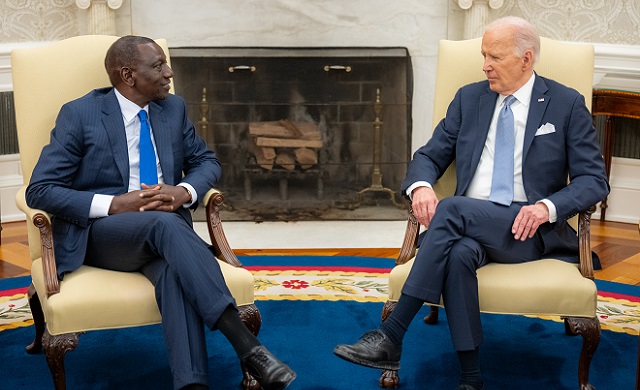
The U.S.-Africa summit is a failure if Americans do not treat Africans as equals
NAIROBI, KENYA | Xinhua | Distrust of the United States has been growing across sub-Saharan Africa for decades, with recent developments widening the country’s credibility gap and offering little hope for improvement.
Earlier this month, U.S. President Joe Biden postponed a trip abroad scheduled for Oct. 13-15, which included stops in Germany and Angola, opting instead to focus on preparations for Hurricane Milton’s arrival in Florida.
Biden briefly visited Germany on Oct. 17-18, but his first trip to Africa as president has been postponed until December after the U.S. elections. For some African observers, the delay underscores the low priority of African affairs within U.S. political strategy.
Meanwhile, signs of dissatisfaction among African nations regarding U.S. involvement are growing. In August, Niger shut down the last U.S. military base in the country, declaring its military cooperation agreement with the United States “illegal.” In May, Ethiopia dismissed a U.S. ambassador’s remarks on its domestic issues as “unsolicited advice.” These incidents point to a broader trend of skepticism and distrust toward U.S. intentions among African countries.
Despite Washington’s continued influence on the continent, the enduring trust deficit remains a persistent challenge for U.S. leaders.
UNFULFILLED PROMISES
Since the U.S.-Africa Leaders Summit in 2014, African countries have expected the United States to deliver on its investment promises. But Washington’s actions tell a different story.
Global data and economic intelligence platform Statista estimated that after a peak in 2014, foreign direct investment from the United States to Africa slid to 44.81 billion dollars in 2020 before recovering to 56.29 billion dollars in 2023.
In 2018, the Trump administration launched an ambitious Prosper Africa initiative touting U.S. efforts to stimulate Africa’s growth through increased trade and investment.
However, the Republican president never set foot on African soil throughout his four-year tenure in the White House. He even substantially slashed the budget of the U.S. Agency for International Development, reducing rather than expanding foreign assistance.
“The U.S.-led response to climate change, development financing, and great power competition continues to favor the Global North,” Cameron Hudson, senior fellow in the Africa Program at the Center for Strategic and International Studies, said in a report.
“This over-promising and under-delivering has only reinforced the well-established perception that Washington is an inherently unreliable, if not hypocritical, partner,” Hudson added.
ARROGANCE
In 2022, the U.S.-Africa Leaders Summit gained attention for an unsettling incident: Over 50 African leaders were transported by bus to the venue.
Kenyan President William Ruto, outraged by the treatment, complained about the leaders being “loaded onto buses like school kids.”
“The U.S.-Africa summit is a failure if Americans do not treat Africans as equals,” said Arikana Chihombori-Quao, former representative of the African Union to the United States. “Historically, the United States has viewed Africa as its ‘backyard’ and practiced racial discrimination against Africans.”
The U.S. engagement with Africa is also characterized by being out of touch with the continent’s realities.
Guinea-Bissau political analyst Seco Cassama said that the United States completely ignores African realities, including “its traditions, its civilizations, always imposing its interests over those of Africans.”
The U.S. military presence in Niger has come under question. According to an analysis by Olayinka Ajala, a lecturer in politics and international relations at Leeds Beckett University, terrorist activities and deaths have steadily increased since 2014 despite the U.S. military operations that began in 2013.
“In fact, the number of attacks has increased significantly since 2018 when the U.S. opened Air Base 201 in Agadez,” said the scholar.
INTERFERENCE AND COERCION
African countries have long struggled with Washington’s high-handed interference in their domestic affairs. One major obstacle in U.S.-Africa relations is the wielding of political interference through economic means.
The African Growth and Opportunity Act (AGOA), a unilateral preferential policy, is the cornerstone of U.S.-African economic exchanges.
Beneficiary countries must meet numerous non-economic criteria, such as democratic reforms, rule of law, and human rights protections. If a country loses its eligibility, there is no dispute resolution process. AGOA has thus become an important tool for U.S. intervention in African affairs.
On Jan. 1, 2022, the United States revoked Ethiopia’s privileges under AGOA, causing a major blow to Ethiopia’s thriving textile and apparel industry.
In October 2023, the United States suddenly announced that Gabon, Niger, Uganda, and the Central African Republic would be excluded from AGOA starting Jan. 1, 2024, citing human rights and democracy issues.
The United States uses its superpower status and economic might to intimidate other countries in a blatant display of authority and arrogance that offends Africa, said The Herald newspaper of Zimbabwe.
In May, U.S. Ambassador to Ethiopia Ervin Massinga called for a “transparent transitional justice process” to confront reports of alleged arbitrary detentions and sexual violence. Ethiopian authorities condemned his contentious speech, describing his remarks as “uninformed assertions” and “unsolicited advice” on Ethiopia’s internal affairs.
During U.S. Vice President Kamala Harris’ visit to Africa in March last year, President of Zambia’s Socialist Party Fred M’membe accused the United States of orchestrating coups and overthrowing governments.
“Today, such a country comes to teach us what democracy is,” said M’membe.
 The Independent Uganda: You get the Truth we Pay the Price
The Independent Uganda: You get the Truth we Pay the Price



